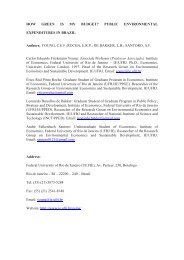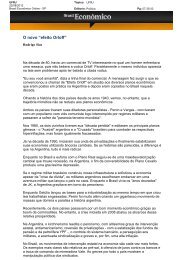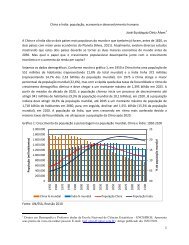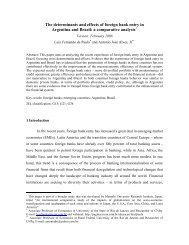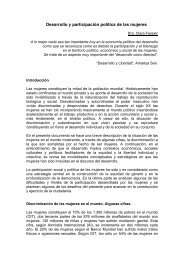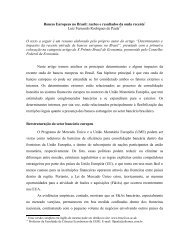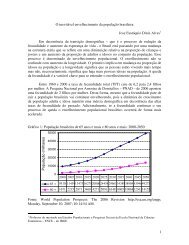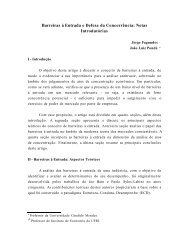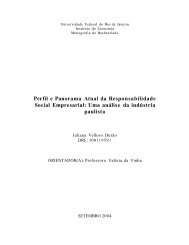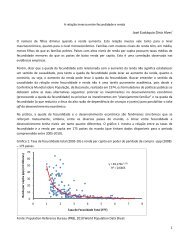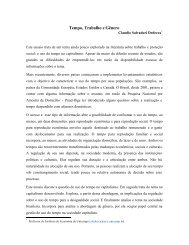Trade Integration for the Americas: What Can Economic Analysis ...
Trade Integration for the Americas: What Can Economic Analysis ...
Trade Integration for the Americas: What Can Economic Analysis ...
- No tags were found...
Create successful ePaper yourself
Turn your PDF publications into a flip-book with our unique Google optimized e-Paper software.
21multilateral trade negotiations requires effective leadership, and <strong>the</strong>re is a public goodsdimension to such leadership. In <strong>the</strong> past that leadership has been provided by <strong>the</strong> UnitedStates. However, <strong>the</strong> American economy is no longer <strong>the</strong> dominant <strong>for</strong>ce in <strong>the</strong> worldeconomy that it once was, and <strong>the</strong> US has seemingly abdicated that decisive leadershiprole. Third, and relatedly, one can argue that <strong>the</strong> US, with its new emphasis on enteringinto RTAs on a worldwide basis, is not only no longer leading but is now underminingmultilateralism. The US seemingly is no longer <strong>the</strong> champion of multilateralism that itonce was but instead, through its actions, is effectively eroding that system. In addition,<strong>the</strong> European Union through its own pursuit of preferential arrangements is playing asimilar, nonleadership role.A fourth reason explaining <strong>the</strong> rise in regionalism, at least as far as Latin Americais concerned, relates to what can be considered as a partial triumph of economicrationality. After years of emphasis on <strong>for</strong>ced import substituting industrialization andaccompanying anti-trade biases in economic policies, recognition grew that those policieswere impeding growth. In backing away from autarchistic policies, <strong>the</strong>re was a growingawareness among Latin American economists and policy-makers that trade is important<strong>for</strong> growth and that trade and o<strong>the</strong>r policies also matter. The experience of Chile wi<strong>the</strong>conomic and trade liberalization, along with that of o<strong>the</strong>r countries, had an influence. Asa result of this increased economic rationality, Latin American countries began toundertake structural re<strong>for</strong>ms and to emphasize trade more seriously. 24 A corollary to thisgreater economic rationality is an increased acceptance of having to live with <strong>the</strong> UnitedStates and o<strong>the</strong>r developed countries. Indeed those markets are important, and gettingaccess may be more than a matter of simply complaining about protectionism in <strong>the</strong> moreindustrialized countries. Finally, with many countries liberalizing trade policies and/orentering into RTAs, <strong>the</strong>re has been something of a bandwagon effect. Many countriessimply may have wanted not to be left out of <strong>the</strong> growing proliferation of RTAs.US policies, as indicated above, have had an effect in promoting <strong>the</strong> proliferationof regional trade arrangements in recent years. The United States may have drifted intosuch policies ra<strong>the</strong>r than pursued <strong>the</strong>m as part of a designed, ex ante strategy. Indeed, <strong>the</strong>US was a stalwart defender of multilateralism into <strong>the</strong> late 1980s. In 1985 it entered intoa bilateral RTA with Israel <strong>for</strong> presumably largely political reasons; in 1988 a similartrading arrangement was initiated with <strong>Can</strong>ada, this time <strong>for</strong> mostly economic reasons.An increase in <strong>the</strong> momentum towards regionalism came when <strong>the</strong> US entertained andaccepted a proposal from <strong>the</strong> Salinas Government in Mexico to join <strong>the</strong> US and <strong>Can</strong>adain <strong>the</strong>ir FTA. The <strong>for</strong>mation of NAFTA marked an important departure <strong>for</strong> <strong>the</strong> US; <strong>the</strong>NAFTA Treaty included an accession clause envisaging NAFTA’s expansion.Subsequently, however, Chilean and CARICOM requests to join NAFTA were refused.This refusal pointed US policies in a somewhat different direction, involving “hub andspokes” RTA arrangements, while at <strong>the</strong> same time publicly reaffirming <strong>the</strong> stated USobjectives to pursue <strong>the</strong> FTAA. If <strong>the</strong> FTAA was ever a serious US objective, <strong>the</strong>piecemeal expansion may have been <strong>the</strong> best way to proceed. With piecemeal accessions,<strong>the</strong> pressures would have eventually been high on Brazil (<strong>the</strong> rest of MERCOSUL and24 See Gurgel and Tyler (2005) <strong>for</strong> a discussion of <strong>the</strong> effects of trade policy liberalization in Brazil.



